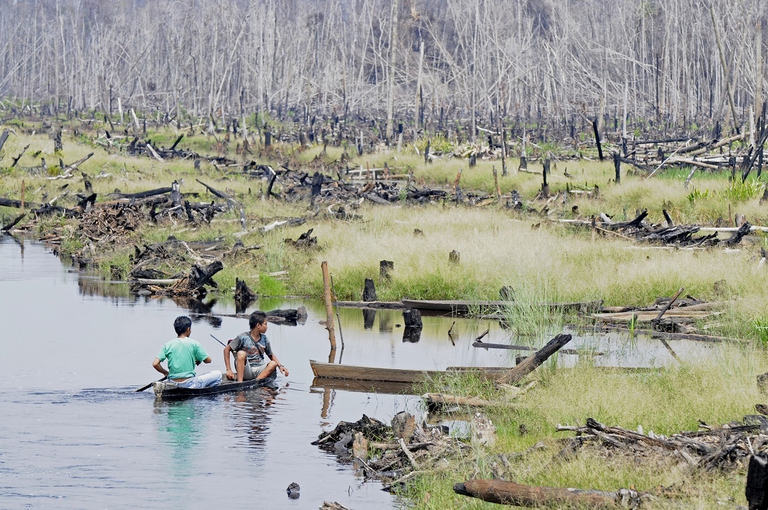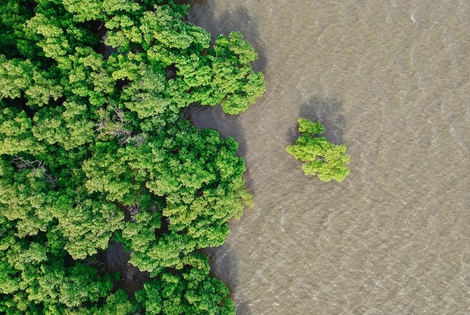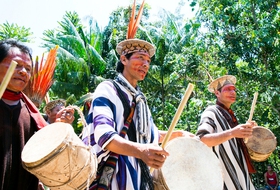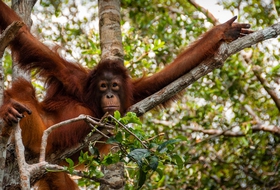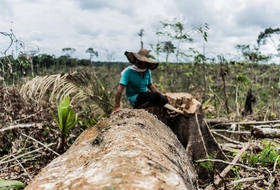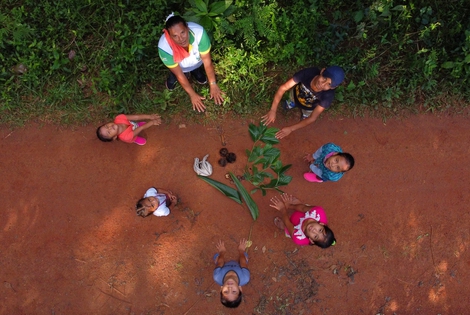
The Amazon became an alternative classroom during the pandemic. Now, the educational forest in Batraja, Bolivia, lives on to teach children and adults the value of nature.
Il documentario Before the flood evidenzia il ruolo della diffusione incontrollata delle coltivazioni di palma da olio nell’inquinamento emesso dall’Indonesia.
800,000 hectares of forest are wiped out every year in Indonesia. From 2000 to 2012, more than 6 million hectares of old-growth forest have been cut down, leaving a vacuum in the country’s and the world’s heart. One of the main causes is the cultivation of oil palm, which cause forests to be turned into industrial plantations. This process contributes to emitting large quantities of CO2 into the atmosphere, as these forests are carbon-rich peat bogs.
Before the Flood, documentary produced and starring Leonardo DiCaprio and directed by Fisher Stevens, shows the dramatic consequences of climate change. Among other things, it highlights the crucial role forest destruction plays in driving pollution in Indonesia, which has become one of the major carbon emitting countries in the world. The movie also focuses on the proliferation of oil palm plantations in South-East Asia.
https://www.youtube.com/watch?v=qluqp4xmkqI&oref=https%3A%2F%2Fwww.youtube.com%2Fwatch%3Fv%3Dqluqp4xmkqI&has_verified=1
For the filming of the documentary, DiCaprio has travelled to Indonesia, visiting the Gunung Leuser Park, one of the planet’s most biodiverse ecosystems. While he flies over the forests aboard a helicopter, the actor focuses on the thick haze blanketing the surroundings: “It’s scary, we can’t see anything”. The movie highlights how Indonesia is also affected by arsons aimed at making space to new oil palm plantations. Palm oil is the world’s cheapest vegetable oil and is used for the production of food, cosmetics, and cleansers.
“This important film brings much needed attention to the destruction of rainforests for palm oil, which is a huge driver of global climate change,” said Lindsey Allen, executive director of Rainforest Action Network. “We must aggressively address the deforestation crisis in places like Indonesia’s Leuser Ecosystem. With palm oil in roughly half of all packaged goods at the grocery store, it’s up to all of us to demand major global brands finally do the right thing and break the link between their products and tropical forest destruction”.
Siamo anche su WhatsApp. Segui il canale ufficiale LifeGate per restare aggiornata, aggiornato sulle ultime notizie e sulle nostre attività.
![]()
Quest'opera è distribuita con Licenza Creative Commons Attribuzione - Non commerciale - Non opere derivate 4.0 Internazionale.
The Amazon became an alternative classroom during the pandemic. Now, the educational forest in Batraja, Bolivia, lives on to teach children and adults the value of nature.
Our species took its first steps in a world covered in trees. Today, forests offer us sustenance, shelter, and clean the air that we breathe.
Bangladesh suffered widespread damage as a result of Cyclone Amphan. Yet the Sundarbans mangrove forest acted as a natural barrier protecting the country from further destruction, as it has done countless times before.
On top of a 2.4 million dollar compensation, the indigenous Ashaninka people will receive an official apology from the companies who deforested their lands in the 1980s.
The tapir was reintroduced into Brazil’s Atlantic Forest, the country’s most at-risk ecosystem. The species can play a key role in the forest’s recovery.
Forests are home to 80 per cent of the world’s terrestrial biodiversity. This year’s International Day of Forests highlights the urgent changes needed to save them.
After a legal battle that lasted two years, Indonesia’s Supreme Court has revoked the permit to mine for coal in the forests of South Kalimantan in Borneo.
The list of human and animal victims of the Australia wildfires keeps growing – one species might already have gone extinct – as the smoke even reaches South America.
Areas where the FARC guerrilla used to hold power in Colombia have faced record deforestation. Farmers cut down trees, burn land and plant grass for cows. Because, “what else can we do for a living here in the Colombian Amazon”? An intimate report from the heart of the felled forest in Caquetá.
